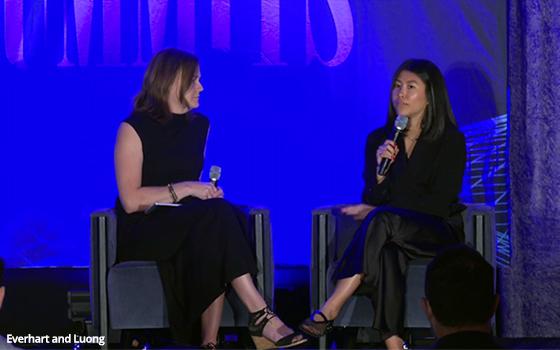
Marketers have a complicated relationship with
value and what drives conversions, according to Erin Everhart, vice president of content at events for MediaPost.
Everhart opened Monday’s Performance Marketing Insider Summit with a
discussion on value, tariffs that may or may not materialize, and discounting strategies to drive immediate conversions.
How do brands reach new audiences without discounting products and
services too much? That has become a challenge, Everhart said, while welcoming Christine Luong, vice president of product at Mastercard, to the stage to talk about going beyond the click to
personalize offers and increase performance.
Mastercard sees all types of consumer purchases, from restaurants to clothing, giving the brand connections with consumers other companies
do not have. It makes their position unique and provides a view into customer acquisition strategies across emerging channels and platforms. It helps them provide personal offers.
advertisement
advertisement
The card
company has a front-row view of how rapidly performance changes.
“Offers” sit in the lower funnel, where marketing strategies typically do. It’s all about the propensity
incentivizing consumers to spend.
How do marketers get personal rather than personalize these offers.
Card-linking technology to these offers has an inherent value for consumers when
they receive offers tied to their preferred card on file.
The merchants follow the money, advertising dollars and campaign budgets. They can see the consumers spending the money and engaging
with the brand. It gives publishers a way to see what consumers spend and where.
Offers, in the broad sense of the term, inform consumer purchasing, with 50% of purchases are made based on the
offers according to Mastercard data.
It's important not to dilute the brand when too many loyalty incentives are offered. Don't get to the point of over discounting or get customers in
the habit of only coming to make a purchase when a discount is available.
“Consumers want to be loyal to brand,” Luong said, but it’s important they stay loyal to the
brand and not to the discount.
When the conversation turned to first-party data, Luong said the luxury is its deterministic. “You know, you don’t need to guess,” she said,
referring to informing strategy and producing performance.
Conversion and spending are some of the most important signals for information personalization strategies, as well as complementary
data such as asking consumers what specific types of offers they want.
“Consumers always tell us they want restaurant or QSR offers, but when you look at their spend, it's grocery
offers,” she said, adding that this is highly contradictory.
Marketers can and should change offers to balance and test to get more prescriptive.
Mastercard
also has an agentic strategy, although Luong did not discuss it in the keynote. The company in April announced the launch of its Agentic Payments Program, Mastercard Agent Pay. It integrates with
agentic AI to change commerce.
The program introduced Mastercard Agentic Tokens to build on tokenization capabilities that today power global commerce like mobile contactless payments, secure
card-on-file, and Mastercard Payment Passkeys, as well as programmable payments like recurring expenses and subscriptions.